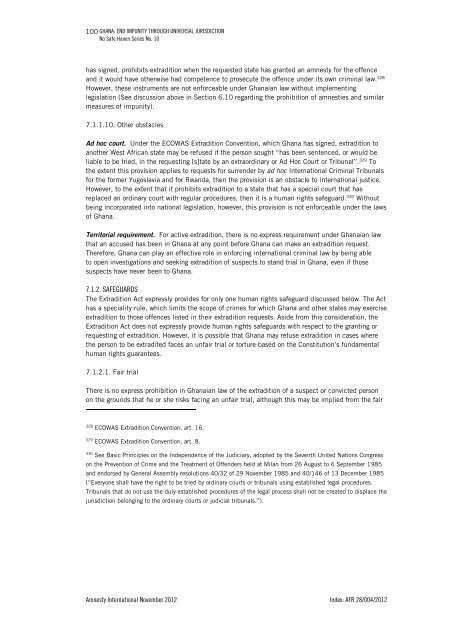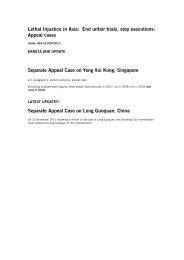Ghana - Amnesty International
Ghana - Amnesty International
Ghana - Amnesty International
You also want an ePaper? Increase the reach of your titles
YUMPU automatically turns print PDFs into web optimized ePapers that Google loves.
100 GHANA: END IMPUNITY THROUGH UNIVERSAL JURISDICTIONNo Safe Haven Series No. 10has signed, prohibits extradition when the requested state has granted an amnesty for the offenceand it would have otherwise had competence to prosecute the offence under its own criminal law. 328However, these instruments are not enforceable under <strong>Ghana</strong>ian law without implementinglegislation (See discussion above in Section 6.10 regarding the prohibition of amnesties and similarmeasures of impunity).7.1.1.10. Other obstaclesAd hoc court. Under the ECOWAS Extradition Convention, which <strong>Ghana</strong> has signed, extradition toanother West African state may be refused if the person sought “has been sentenced, or would beliable to be tried, in the requesting [s]tate by an extraordinary or Ad Hoc Court or Tribunal”. 329 Tothe extent this provision applies to requests for surrender by ad hoc <strong>International</strong> Criminal Tribunalsfor the former Yugoslavia and for Rwanda, then the provision is an obstacle to international justice.However, to the extent that it prohibits extradition to a state that has a special court that hasreplaced an ordinary court with regular procedures, then it is a human rights safeguard. 330 Withoutbeing incorporated into national legislation, however, this provision is not enforceable under the lawsof <strong>Ghana</strong>.Territorial requirement. For active extradition, there is no express requirement under <strong>Ghana</strong>ian lawthat an accused has been in <strong>Ghana</strong> at any point before <strong>Ghana</strong> can make an extradition request.Therefore, <strong>Ghana</strong> can play an effective role in enforcing international criminal law by being ableto open investigations and seeking extradition of suspects to stand trial in <strong>Ghana</strong>, even if thosesuspects have never been to <strong>Ghana</strong>.7.1.2. SAFEGUARDSThe Extradition Act expressly provides for only one human rights safeguard discussed below. The Acthas a speciality rule, which limits the scope of crimes for which <strong>Ghana</strong> and other states may exerciseextradition to those offences listed in their extradition requests. Aside from this consideration, theExtradition Act does not expressly provide human rights safeguards with respect to the granting orrequesting of extradition. However, it is possible that <strong>Ghana</strong> may refuse extradition in cases wherethe person to be extradited faces an unfair trial or torture based on the Constitution’s fundamentalhuman rights guarantees.7.1.2.1. Fair trialThere is no express prohibition in <strong>Ghana</strong>ian law of the extradition of a suspect or convicted personon the grounds that he or she risks facing an unfair trial, although this may be implied from the fair328ECOWAS Extradition Convention, art. 16.329ECOWAS Extradition Convention, art. 8.330See Basic Principles on the Independence of the Judiciary, adopted by the Seventh United Nations Congresson the Prevention of Crime and the Treatment of Offenders held at Milan from 26 August to 6 September 1985and endorsed by General Assembly resolutions 40/32 of 29 November 1985 and 40/146 of 13 December 1985(“Everyone shall have the right to be tried by ordinary courts or tribunals using established legal procedures.Tribunals that do not use the duly established procedures of the legal process shall not be created to displace thejurisdiction belonging to the ordinary courts or judicial tribunals.”).<strong>Amnesty</strong> <strong>International</strong> November 2012 Index: AFR 28/004/2012
















